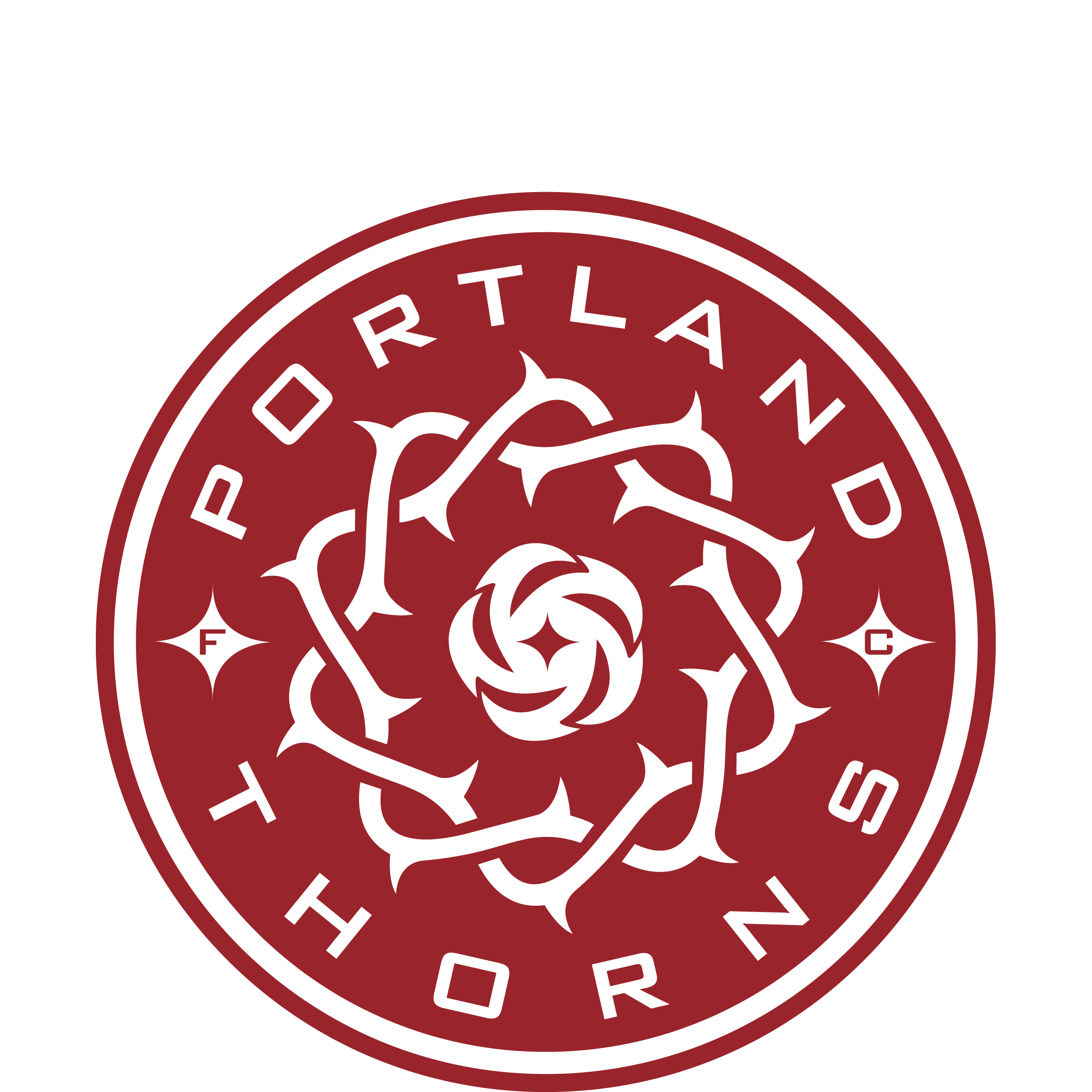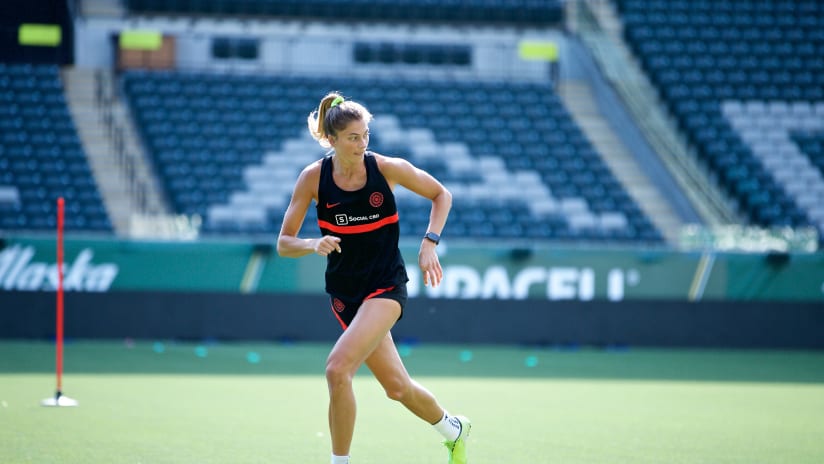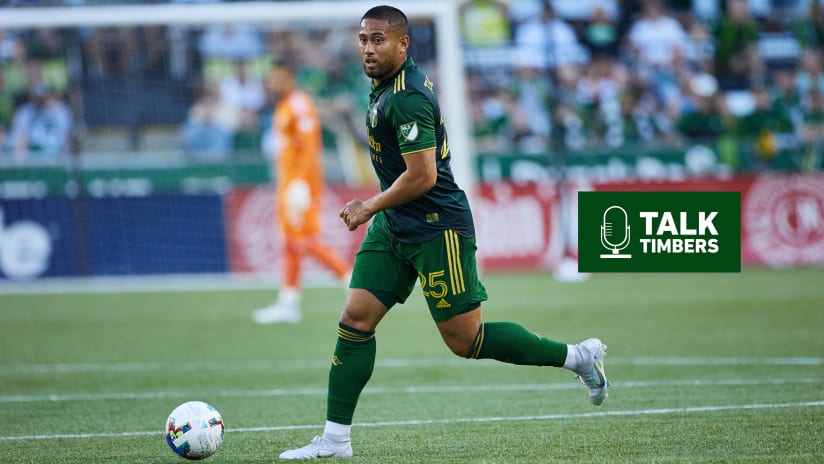Kelli Hubly has started to get uncomfortable. The quote was too long, and by the end of it, the words almost felt too nice. But they were words that she’d worked over three years to hear, ever since she joined Portland Thorns FC after her collegiate days at DePaul. They came in the wake of her breakout performances at this summer’s NWSL Challenge Cup.
“[She not only] performed very well,” her head coach, Mark Parsons said, three weeks earlier. Over a Zoom call, Hubly’s hearing his words for the first time.
“She is key to our game model The way she was distributing and eliminating players with first-touch passes,” he remembered, “with a dribble, or a with two-touch, pulling a striker in, letting them get closer to then play to [midfielder] Ang [Salem], who has now got more time because of that touch ...
“She was being incredibly intelligent.”
When the words finally stop, Hubly takes a breath, then reacts. Reacts after three occasionally “frustrating” years. Reacts after a professional start that’s been, she says, “an up-and-down roller coaster.”
“It’s so great to hear,” she says, about Parsons’ appraisal, “This has been years in the making: me wanting this reaction from him when I play.
“It's the best feeling ever, knowing that all the work I've put in the past couple of years, when I've struggled to even want to play soccer anymore, [thinking], 'Am I ever going to play? Am I ever going to get the chance?'
“I feel like I've finally broken through the wall. To hear these things, it's amazing, because honestly, I've been working so hard at all that stuff.”
Hold on. Go back. “Struggled to even want to play soccer anymore?” After her performances in July, it’s a jolting thought. Hubly was among the best center backs at the NWSL’s one-time event, moving from her then-preferred position, right back, when U.S. international Becky Sauerbrunn was injured during the tournament’s first game.
To think that person who was giving those performances was recently unsure about her career is jarring. But upon a closer look, it’s also understandable. In 2018, one year after training as a non-roster player Portland for much of her first professional season, Hubly made nine starts and played 818 minutes. Her career was on course. Last year, though, play time evaporated. Three starts, 251 minutes, and a number of times she was left out of gameday 18s entirely.
“I would get in a lot of blah moods,” she admitted. “You can go to practice and nothing seems good enough. Your best days don't feel good enough. Or you have a bad day, and you're like, 'no wonder I'm not playing.’ It definitely messes with your head a lot.”
Hubly gives credit to her teammates’ help. “Those are my friends. I'm not going to show up to practice in this [bad] mood because I'm not playing. No. They put a smile on my face.” But she needed more than the locker room’s support.
“The sports psych[ologist] helped a bunch for me to put things in perspective,” she says, describing another tool she used to get back on course. “'I began thinking, ‘you know what? It's OK to not be playing. There are other people not playing. But as long as I'm going in every day and working as hard as I can, and doing good to the point that I can leave practice thinking I did my best, then that kind of satisfies me.’”
“That was the biggest change for me,” she says. “After I started seeing [the sports psychologist], I saw a huge difference in my play, and my general happiness.”
This is part of the Portland reality for players like Hubly. It’s an NWSL reality, too. A college system that cranks out talent leaves too many players for too few professional spots. Add in the fact that the league hasn’t expanded since the Orlando Pride’s addition in 2016 (it has, conversely, contracted from 10 to nine teams), and you have players like Hubly. And Tyler Lussi. And Madison Pogarch, as well as a number of other Thorns. Players in places like Portland have world-class environments, top internationals to train with, but only seven months and 24 games of opportunities. Where do they show their growth?
Hubly’s asked the obvious: Would you rather be be living this Portland reality or be on another team, one where opportunities might come easier?
“It is frustrating, “ she admits, “but also, at the same time, if you take a step back, you realize, 'you know what? I’m on a great team.' ... I'd rather be on this team learning from amazing players everyday and growing than be on a different team and not be growing.”
As much as Hubly’s play in Utah was a vindication of her talent, it was a vindication of that decision. Having earned playing time in the weeks before Utah, hers was a surprise name in the starting lineup for the tournament’s opening game against North Carolina. She’d make four more starts in the tournament, all at centerback, with Portland holding opponents to 0.42 goals-per-90-minutes with her on the field.
“I definitely identify as a centerback, now,” she admits, when asked about her right back past. “I think I'm way more solid at centerback than outside back. I know how to read the game better at centerback. It's more fitting and comfortable …
“And I think I'm really good at stepping in and winning the ball, tackling people. It just fits my style better than right back, even though I have more fun at right back. Centerback, you're just stuck, and that's where it gets you.”
She’s finding her way around that, though. One moment from Utah showed how. Set up just inside Portland’s attacking half, Hubly regained possession without being pressured. The Thorns possession game had pushed their opponents back. The forward had gone back to help. With no sense of urgency from oncoming players, Hubly took a touch. Then another. Then another. Soon she was at the level of her central midfielders, looking to play into the forward line, when she would normally be trying to connect with a holding midfielder. She’s eliminated half of the opponent’s defenders.
“Me and Mark have talked about this, because he loves that I drive the ball,” Hubly explains. “I think during the Challenge Cup I did a good job of driving and being able to pass. But there are times at practice when I get the ball and drive, and I either dribble too much and I’m not making the right pass, or I just dribble into somebody because I can't make up my mind where to go. That's something that I'm trying to work on, to not dribble too far where I just run into somebody but also keep the dribbling up, but just make sure that I am playing the right ball …
“[Portland’s coaches] love that strength of mine. They think it's great because I think other teams aren't really sure what to do when the center back is just dribbling.”
It’s one of the comforts the 26-year-old, a collegiate forward, is finding in her new position. “I'm going to get the ball,” she says, as if to herself, “and I’m going to run. If I'm stepping in to win the ball, I'm just going to go.”
These aren’t words of frustration. This isn’t a player on a roller coaster. To the extent they reflect a player needing help from a sports psychologist, those words reflect time well spent, and help well given. Now, instead of wondering if she will ever get playing time, Hubly can ask how much playing time she’s earned.
She can ask because she’s earned it before. Parsons’ words said as much, but they’re only part of the praise she’s earned.
“Hearing [the good things], it’s amazing to hear,” she concedes, “because every player wants that praise … After all I've gone through, it's just icing on the cake.”
Watch the Thorns open the NWSL Fall Series Sunday when they face Utah Royals FC at 12pm PT on Twitch.














